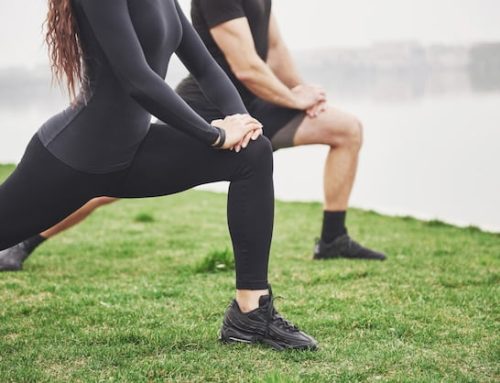The Importance of Stretching for Muscle Health
Stretching is an essential aspect of maintaining healthy muscles. Whether you’re a professional athlete or an office worker, incorporating stretching into your daily routine can help you maintain flexibility and prevent injuries. In addition to helping alleviate muscle pain, stretching can also aid in preventing stiffness and promoting proper posture. However, did you know that a vitamin deficiency can cause tight muscles? In this article, we’ll take a closer look at the correlation between vitamin deficiencies and tight muscles.
What is a Vitamin Deficiency?
Before jumping into the correlation between vitamin deficiencies and tight muscles, it’s important to understand what a vitamin deficiency is. A vitamin deficiency occurs when your body does not get enough of a specific vitamin. Vitamins are an essential nutrient that plays a crucial role in maintaining good health. There are 13 vitamins that are essential for the human body, and each plays a unique role in maintaining optimal health.
The Role of Vitamins in Muscle Health
Muscles are an integral part of the human body, and they require a variety of vitamins to function correctly. Some of the most essential vitamins for muscle health include vitamin D, vitamin E, vitamin C, and the B vitamins. Vitamin D plays a crucial role in regulating calcium and phosphate levels in the body, which can impact muscle function. Vitamin E is an antioxidant that can help prevent muscle damage caused by free radicals, while vitamin C aids in collagen production, which is essential for muscle tissue growth and repair. Additionally, the B vitamins help convert food into energy, which is necessary for muscle function. Vitamins play a crucial role in maintaining muscle health and function. They are essential nutrients that our bodies require in small amounts to perform various functions, including energy production, immune function, and tissue repair.
Here are some of the key vitamins and their roles in muscle health:
| Vitamin | Role in Muscle Health |
|---|---|
| Vitamin D | Helps maintain muscle strength, balance, and coordination. May improve muscle function in older adults. |
| Vitamin C | Helps with collagen synthesis, which is necessary for maintaining healthy muscles, tendons, and ligaments. Also has antioxidant properties that may reduce muscle damage from exercise. |
| Vitamin E | Acts as an antioxidant, which may help reduce muscle damage and inflammation from exercise. May also improve muscle strength and endurance. |
| Vitamin B12 | Plays a role in the formation of red blood cells, which are necessary for delivering oxygen to muscles during exercise. May also improve muscle strength and endurance. |
| Vitamin B6 | Plays a role in energy production and muscle protein synthesis. May also help reduce muscle soreness and inflammation. |
| Vitamin A | Necessary for muscle growth and development. May also improve muscle function in older adults. |
It’s worth noting that these are just some of the key vitamins involved in muscle health, and there are many other nutrients and factors that also play a role. A balanced and varied diet that includes a wide range of vitamins and minerals is important for overall health and muscle function.
How Vitamin Deficiencies can Impact Muscle Health
A vitamin deficiency can cause a variety of health issues, including tight muscles. For example, a vitamin D deficiency can weaken muscles and cause muscle pain, which can lead to tight muscles. Similarly, a vitamin E deficiency can lead to muscle weakness and pain, which can also cause tight muscles. Additionally, a vitamin C deficiency can lead to muscle cramps and spasms, which can cause tightness in the muscles.

A year-long supply of 365 vegan multivitamin tablets, crafted in the UK. Specially formulated for both men and women, each tablet is packed with 26 essential active vitamins and minerals. An all-encompassing solution for daily nutritional support.
The Importance of Proper Nutrition
Incorporating a healthy, balanced diet is crucial in maintaining proper vitamin levels and preventing deficiencies. Eating a variety of fruits, vegetables, lean proteins, and whole grains can help ensure that you’re getting the essential nutrients your body needs to maintain optimal health. Additionally, taking a multivitamin supplement can help fill any nutritional gaps in your diet.
Stretching Exercises to Relieve Tight Muscles
If you’re experiencing tight muscles, incorporating stretching exercises into your daily routine can help alleviate pain and prevent further tightness. Some of the most effective stretching exercises for tight muscles include hamstring stretches, calf stretches, and hip flexor stretches. It’s important to note that stretching should be done slowly and gently, and should never be forced or painful. If you’re unsure about how to properly stretch, consider seeking guidance from a physical therapist or certified trainer.
Here are some stretching exercises that can help to relieve tight muscles:
- Hamstring stretch: Sit on the floor with your legs extended in front of you. Reach forward and try to touch your toes, keeping your knees straight. Hold the stretch for 30 seconds and repeat on the other side.
- Quad stretch: Stand with your feet hip-width apart. Bend one knee and bring your foot towards your buttocks. Hold onto your ankle with your hand and pull your foot towards your buttocks until you feel a stretch in the front of your thigh. Hold the stretch for 30 seconds and repeat on the other side.
- Hip flexor stretch: Kneel on one knee with your other foot in front of you. Keep your back straight and push your hips forward until you feel a stretch in the front of your hip. Hold the stretch for 30 seconds and repeat on the other side.
- Chest stretch: Stand with your feet hip-width apart. Clasp your hands behind your back and lift your arms up, squeezing your shoulder blades together. Hold the stretch for 30 seconds.
- Neck stretch: Sit or stand with your back straight. Tilt your head to one side, bringing your ear towards your shoulder. Hold the stretch for 30 seconds and repeat on the other side.
- Shoulder stretch: Stand with your feet hip-width apart. Bring one arm across your chest and hold it with your other hand. Gently pull your arm towards your chest until you feel a stretch in your shoulder. Hold the stretch for 30 seconds and repeat on the other side.
Remember to hold each stretch for at least 30 seconds and breathe deeply throughout the stretch. Don’t force the stretch beyond what feels comfortable, and stop if you feel any pain or discomfort. Stretching should feel good and help to relieve tension and tightness in your muscles.
Conclusion
In conclusion, maintaining optimal vitamin levels is crucial in maintaining muscle health and preventing tight muscles. Incorporating a healthy, balanced diet and taking a multivitamin supplement can help ensure that you’re getting the essential nutrients your body needs. Additionally, incorporating stretching into your daily routine can help alleviate pain and prevent further tightness. If you’re experiencing persistent muscle pain or tightness, consider speaking with a healthcare professional to determine the underlying cause and develop a treatment plan.






